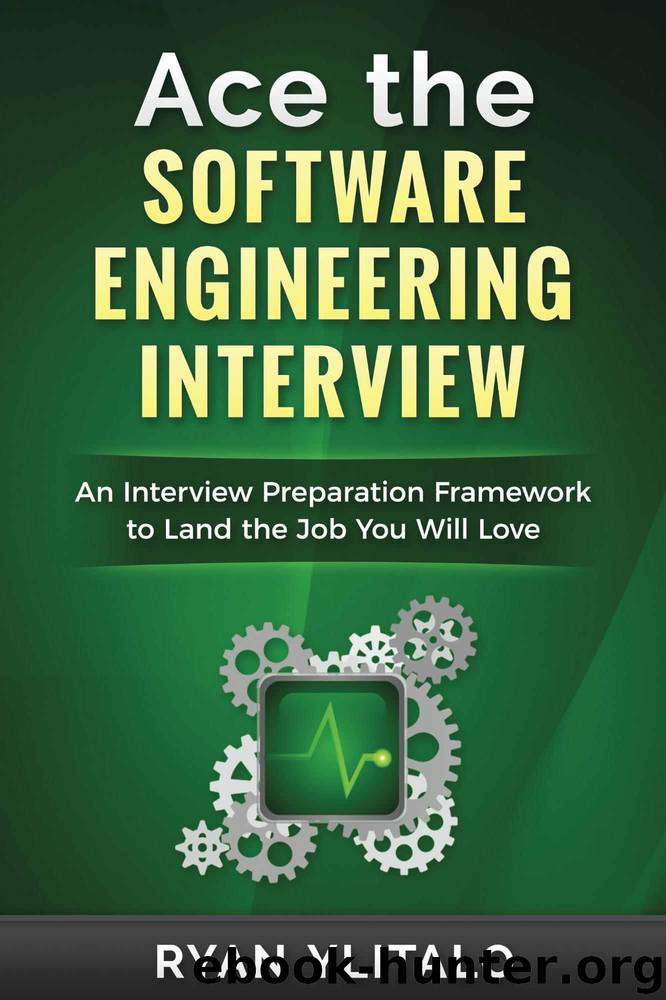Ace the Software Engineering Interview: An Interview Preparation Framework to Land the Job You Will Love by Ryan Ylitalo

Author:Ryan Ylitalo [Ylitalo, Ryan]
Language: eng
Format: azw3
Publisher: BytePerceptions LLC
Published: 2015-12-11T16:00:00+00:00
11 - Interview for Success
It is important to practice prior to your interview. However, there are also a number of things you should do during the interview to create an impression of competence, likeability, and trust. Having an awareness of these principles can significantly improve your chances of leaving a good impression.
In its simplest form, an interview consists of the following three components: questions, responses, and response ratings. Both you and the interviewer are looking for the proper fit. Both of you will have the opportunity to drive discussion and ask questions. As the candidate, you need to make sure you ask any questions required to help you understand how the position will fit you. In the following sections, we will discuss a few ideas that will help maximize your interview experience.
Questions
It will be primarily the interviewer asking you questions, but remember that you are trying to determine whether the position is a match for you also. Prepare a list of questions prior to the interview that will help you determine whether this particular role is going to be the perfect fit for you. When asking questions, keep the following things in mind:
• Focus on Opportunity - by focusing on what the opportunities of the position will provide you, you will appear engaged and interested in the position for the right reasons. You will come off as motivated and driven.
• Don't Ask Questions That You Could Have Answered Yourself - do not ask any questions that you could have easily answered by browsing the company website, the job description, or a quick Google search. This will give the impression that you are not organized, not prepared, lazy, and not that interested in the position.
• Ask the Interviewer to Describe Real Job Needs - this will help you determine whether the ideal candidate characteristics line up with your own. Remember that you are searching for a role that fits you as much as the company is searching for a candidate that fits the role. It will also help you understand which of your skills and competencies you should focus on during the interview.
• Ask about the Next Steps - this shows that you are engaged in the interview process, and interested in the possibility of accepting this position if offered. If you do not show interest in the position, the company isn't going to be interested in making you an offer.
• Watch for Repeat Questions - if the interviewer asks you the same questions, rephrased in a slightly different manner, think clearly about what your response should be. This typically means that the initial answer you gave them was not satisfying in some way. Try to figure out why the interviewer was not fully satisfied with your previous response. Tailor your subsequent answers in a way that will appease their concern.
• Do Not Focus on Material Factors - do not ask any questions that focus on compensation, commute, flexibility, etc. These things can often be negotiated if you receive an offer.
Download
This site does not store any files on its server. We only index and link to content provided by other sites. Please contact the content providers to delete copyright contents if any and email us, we'll remove relevant links or contents immediately.
| Business School Guides | GMAT |
| Guides | Interviewing |
| Job Hunting | Job Markets & Advice |
| Resumes | Vocational Guidance |
| Volunteer Work |
The Motivation Myth by Jeff Haden(5202)
Audition by Ryu Murakami(4921)
Adulting by Kelly Williams Brown(4564)
The Confidence Code by Katty Kay(4248)
A Mind For Numbers: How to Excel at Math and Science (Even If You Flunked Algebra) by Barbara Oakley(3294)
Waiting in the Wings by Melissa Brayden(3210)
Self-Esteem by Matthew McKay & Patrick Fanning(3136)
Fooled by Randomness: The Hidden Role of Chance in Life and in the Markets by Nassim Nicholas Taleb(3105)
The ONE Thing by Gary Keller(3061)
Nice Girls Don't Get the Corner Office by Lois P. Frankel(3034)
The Dictionary of Body Language by Joe Navarro(2986)
How to be More Interesting by Edward De Bono(2789)
Designing Your Life by Bill Burnett(2738)
Getting Things Done by David Allen(2690)
The Plant Paradox by Dr. Steven R. Gundry M.D(2608)
Police Exams Prep 2018-2019 by Kaplan Test Prep(2540)
What Color Is Your Parachute? 2015 by Richard N. Bolles(2300)
Dangerous Personalities by Joe Navarro(2283)
When to Jump by Mike Lewis(2239)
